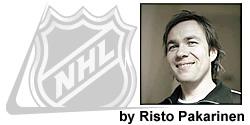
“The Finnish journalist recalls his USSR memories, predicts big things for Russian hockey.”
The Russians are coming
For five years, I’ve been telling everyone that in five years, the Russians are going to dominate world hockey once again. So if they don’t win the World Championships this year, I still have a few years in the bank.
Admittedly, you don’t have to be a genius to make that prediction. With the talent in the teams the Russians have iced even since 1991, after the break-up of the Soviet Union, the fact that they have only three medals, and no titles since 1992, is a bigger miracle than that they lost one game in Lake Placid.
After all, Soviet Union won the World Championship 22 times between 1954 and 1991, and went home without a medal only once. And it’s not like the quality of players went down. Just look at their roster from the 2002 Olympics: Danny Markov, Alexei Kovalev, Alexei Zhamnov, Sergei Gonchar, Pavel Datsyuk, Pavel Bure, Igor Larionov, Sergei Fedorov, Alexei Yashin, Nikolai Khabibulin, Sergei Samsonov, Maxim Afinogenov, Ilya Bryzgalov, Ilya Kovalchuk…
Fifteen years without a championship is a long time (unless you’re a Leafs fan, in which case it’s nothing). The 20-somethings of today can barely remember the times when CCCP was synonymous with total hockey domination.
Sorry, Canada, but when I close my eyes, I don’t see or hear Paul Henderson. I see Guy Lafleur covering his face when Vladimir Krutov fakes a shot, then skates around Lafleur like a pylon in the 1981 Canada Cup, and I hear a legendary Finnish broadcaster say, “See, kids, if Lafleur had worn a helmet, maybe he wouldn’t have done that.”
(and here’s that goal):
The Helsinki World Championships in 1974 is the first tournament I remember; I was seven years old. Between 1974 and 1981, the CCCP men won the World Championship (the only tournament that mattered to me) five times.
I wore number 17, just like Kharlamov, and my coach-dad put together a line with me on the left wing, and numbers 16 (Petrov) and 13 (Mikhailov) next to me.
Even if I idolized them, the Russians were always scary. And distant.
The language was difficult when you can’t even make out the letters. They hardly celebrated their goals, but when they did, they sometimes kissed each other on the ice.
I remember sitting in the back seat of our car, just outside the old Helsinki arena, listening to the radio when somebody called in and said something about the “russkies.” I asked mom about that, and she replied, “They’re actually called Soviets, not all of them are Russians. It’s not nice to call them russkies.”
Ten years later, Kharlamov had died in a car accident, and Gretzky was my man, but having a Soviet team go through our town was still an event. Not only to see them play – and boy could they play – but also because of the trading of things that took place after the games. A hat for a hat, sure! Pins, anyone? A good stick got you crystal glasses and a samovar. Apparently, the Soviet players never used the slap shot because they didn’t want to break their sticks.
I don’t know. I just know that I grew up watching that elegant hockey, the tape-to-tape passes, and the skating that made some of the lesser figure skaters jealous, let alone mere mortal hockey players.
There’s no Soviet Union anymore, and of the players on the current Team Russia at the World Championships (that no longer is the only tournament that matters to me) in Moscow, only seven players were born in the 1970s. The oldest player on the team, Alexander Kharitonov, was fifteen when the Soviet Union collapsed. The Washington Capitals’ Alexander Ovechkin hadn’t even picked up hockey yet when Boris Yeltsin was standing on a tank in front of the Russian White House.
Russia has rebuilt, and Russian hockey has recouped. The Russian Hockey League has quickly become a viable option for top European players, and they don’t need to be trading their hats for sticks anymore.
Feeling their increasing power, and sensing the powerlessness of the International Ice Hockey Federation (IIHF), the Russians even opted out of the NHL-IIHF agreement that oversees, for example, player transfers from Europe to the NHL. Now, when the NHL didn’t budge, and the IIHF was busy creating pseudo research of European players’ career paths and sending press releases of a dream meeting between “an NHL team” and a European champion (of a league that doesn’t exist yet), the Russians came around.
According to ESPN, the NHL, NHL Players’ Association, the IIHF and the seven top European player-producing nations will hammer out the final details of a pact that will reportedly pay European clubs $200,000 for every player signed by an NHL team.
How much would you pay to get Malkin or Kovalchuk?
But let me tell you, those Russians are going to win a big tournament within five years. For sure.
